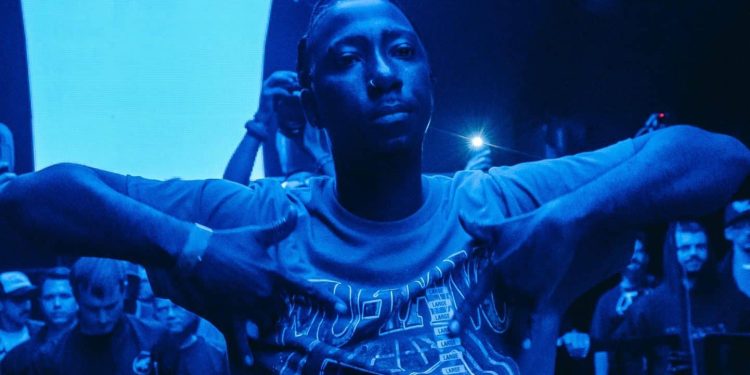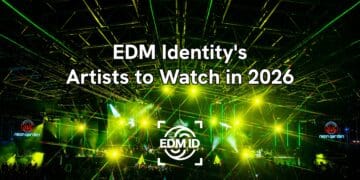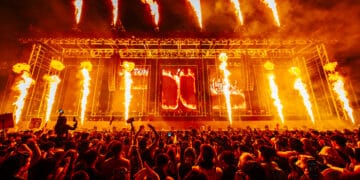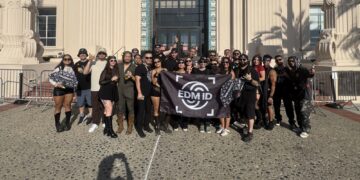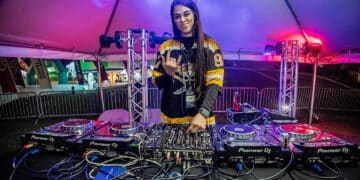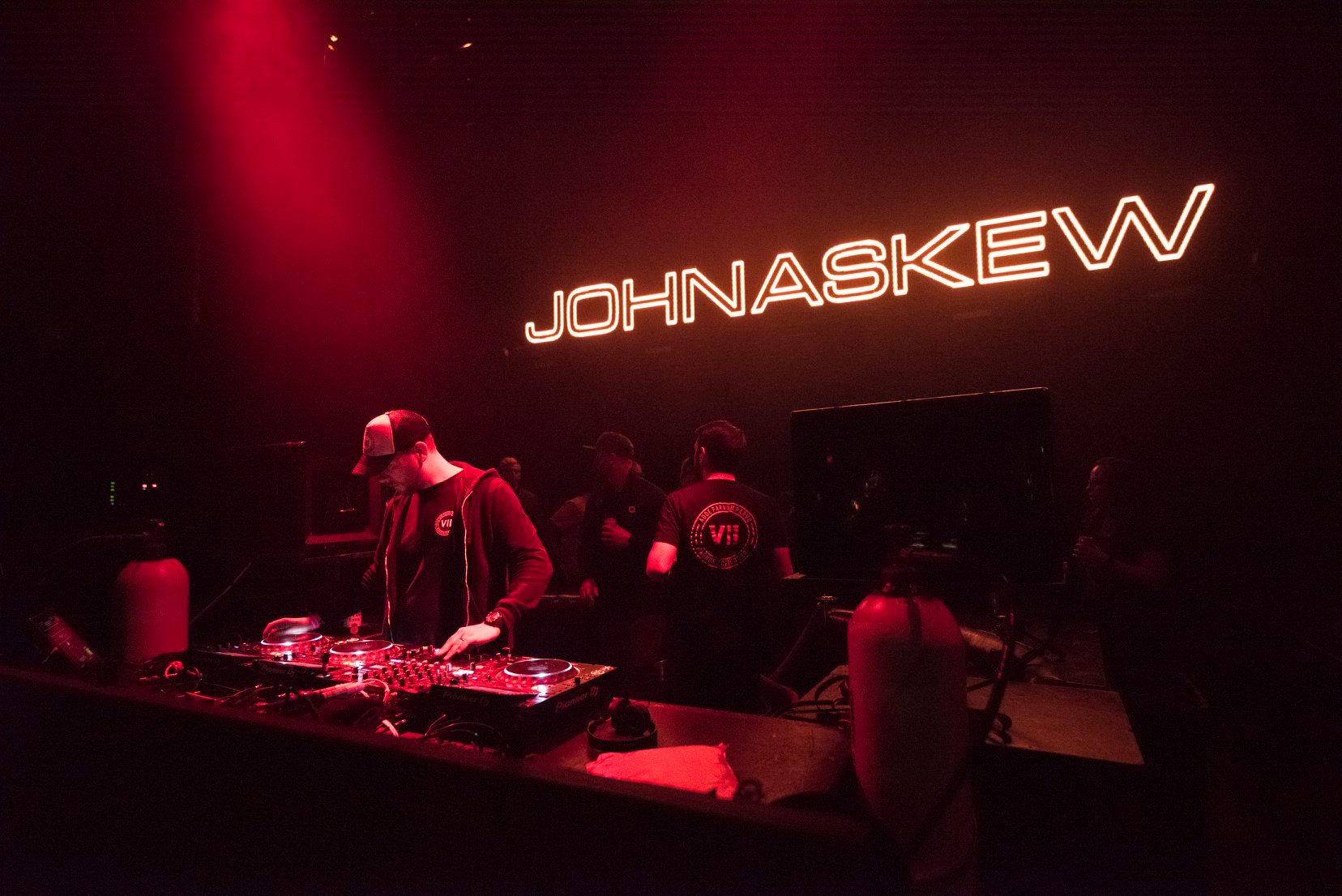Khromata gives us the lowdown on the world of psytrance, her love of the genre, and how she gives back to the community.
With Dreamstate SoCal still on our minds, we can’t help but think about the amazing Khromata. With her ability to ability to effortlessly weave multiple sounds together, she has become well-known within the psy community for her amazing technical ability. However what stuck out to us the most is her foothold as a firm champion of the music community. Khromata became a fan of psychedelic trance as a teenage and remains a fan of the “trippy” sounding genre and psytrance community to this day.
Not only can Khromata go “Full On” psy with the best of the best, but she also represents a handful of artists dedicated to the growth of the music community. Aside from her work behind the decks, she hosts her own special event called Khromata Nights. These events serve as an outlet for upcoming artists as a place to perform and a safe space for music exploration. With this passion for and intimate work within the scene, it’s no wonder that she caught the attention of Iboga Records, one of one of the best labels in psytrance.
Abisola and I had a chance to sit down with Khromata ahead of her Dreamstate set. In this interview, she provides a special perspective on the psytrance culture as it grows in the United States. Check out her set from Dreamstate SoCal below and read on as we explore her many attributes in the psytrance community and what she loves about psychedelic trance.
Watch Khromata Live at Dreamstate SoCal 2018 on YouTube:
Welcome back to Dreamstate Socal, we thoroughly enjoyed your set at Dreamstate in 2017. What are you going to do differently tonight?
Last year, I opened and it was the Iboga Records Hologram show, so I played more progressive psytrance. This year, I’m playing the second slot. I’m playing after Sentinel 7, and I’m playing before Static Movement and WAIO, so I’m going to play a bit harder. I’m kinda just really gonna go for it. I played at 136 bpm last year. I’m going to play at 140 this year probably. I think it’s going to go down well.
It’s cool that you’re not opening. As you said, it’s a totally different dynamic.
Yeah! Someone mentioned to me that I’m one of the first females to not open at a Dreamstate. I played at midnight at Dreamstate Mexico, and I was second at Dreamstate San Francisco. It’s awesome, and I’m honored and really happy that they give me the chance to do this.
Compared to other countries and psytrance festivals (as you’ve been to quite a few), what do you think separates Dreamstate SoCal from the rest?
As far as setting it apart, I’d say it’s a unique and special event. I’ve never been able to put into words how psytrance makes me feel, but I love seeing – especially in recent years – psytrance becoming more popular. Especially with people who are more into trance; I just love seeing that.
Before the trance scene and the psytrance scene, they were like oil and water, but now in some places, there’s more acceptance from both sides and it’s coming together and Dreamstate is exactly that. Like last night, I loved seeing everyone raging out to Astrix’s set, it was amazing to see that. I think Dreamstate is a great place for that and also introducing those who have never heard psytrance. I think that’s what sets it apart, is that it brings people in.
Going off of that, there has been a big boom, especially in the US in progressive trance because we hear triplets in everything now that’s mainstream. What do you think are some of the pros and cons of the psy takeover now that it’s not necessarily underground and you can find it all over?
There’s some people that see a lot of cons in it, the more “underground traditionalists”, and I can understand that fear of change. The obvious cons are a stalemate in areas of musical ingenuity, but it’s all cyclical and the bubble bursts eventually and there’s a new fresh sound. The pros are with populiarty there’s growth. Without growth there’s stagnation, and with stagnation, the scene withers and dies. We’ve seen that with other EDM subgenres over the years, and I think especially with it getting more popular some people are attempting gatekeeping behavior which is very unwelcoming. They want it to stay as pure as it can be but that’s not how I am at all. That’s why I love playing shows like this because I want everyone to experience what I experienced when I heard psytrance for the first time and fell in love. I think everyone who wants it deserves that experience.
How do you think Insomniac and the Dreamstate brand have contributed to the mainstream growth and appeal of psytrance music?
They’re definitely reaching a very wide audience that wasn’t particularly being reached before. It has a lot of visibility and a lot of accessibility and I think that’s definitely how its helped grow. For me, I feel that it’s great – I love the big events. I love Dreamstate but I also hope that once people fall in love with psytrance, they check out the smaller events in their cities and they do support the local scene and that it all kind of feeds into each other. We get these big shows but still support the smaller shows and maybe people will fall in love and want to contribute. It all comes full circle.
You do throw your own shows. You’re a promoter, and you organize there as well. You have your “Khromata Nights” there. What goes into putting on those events, and how does it differ working on the back end versus being in front and on stage?
Throwing events is a lot of work. it’s really intensive, a lot of preparation and organization into throwing events. I have a show coming up in two weeks and I’m super excited but there’s so much to do. I have to do Dreamstate first, you know! It’s my focus right now…but come Monday full steam ahead for my show! I love throwing events though and just to be able to give back to the community to create spaces for people to dance, heal, and connect is so important to me and I love doing that. As much as I love DJing, I love creating spaces to allow people to enjoy themselves.
Often it’s music that draws fans in and the culture that gets them to stay. How would you describe the culture of psytrance to someone who’s not familiar with it?
Short answer? It’s trippy, man! [Laughs] Long answer? I actually wrote my senior thesis on psychedelic trance culture and spirituality, so it is a topic I was really interested in to the point I made it my senior thesis. I studied anthropology and political science. Psytrance culture, in a nutshell, is very intertwined, and yet is very global. Music itself is global, but you go to a big psytrance festival and it’s people traveling to psytrance mecca from all around the world. It’s just this completely international scene. I think it’s very loving and welcoming. People who want to have a good time and dance really hard. It’s a really, really cool scene and I’ve been a part of it since I was 17. I’m not 17 anymore, it’s been a while… [Laughs]
Let’s transition into more specific to you. You grew up in Thailand and now you’re located stateside in San Francisco. Both of these areas have their own distinctive nightlife scene. How have those two cultures (San Francisco is a culture in and of itself) influenced you and your work and your production and your artistry?
I grew up a Bangkok club kid; I grew up clubbing since I was really young. I would go to the underground clubs and they also have the full moon parties and the beach psytrance parties so I got to check out all of that stuff. That was my first influence – those underground scenes. As far as San Francisco, it stems from the underground. I’m not a purist though. I don’t think “oh, it’s just about the underground”, you know? I’m for, as I mentioned, accessibility and people experiencing what I experienced, but it was definitely those origins that got me to where I am and kind of keeps me grounded.
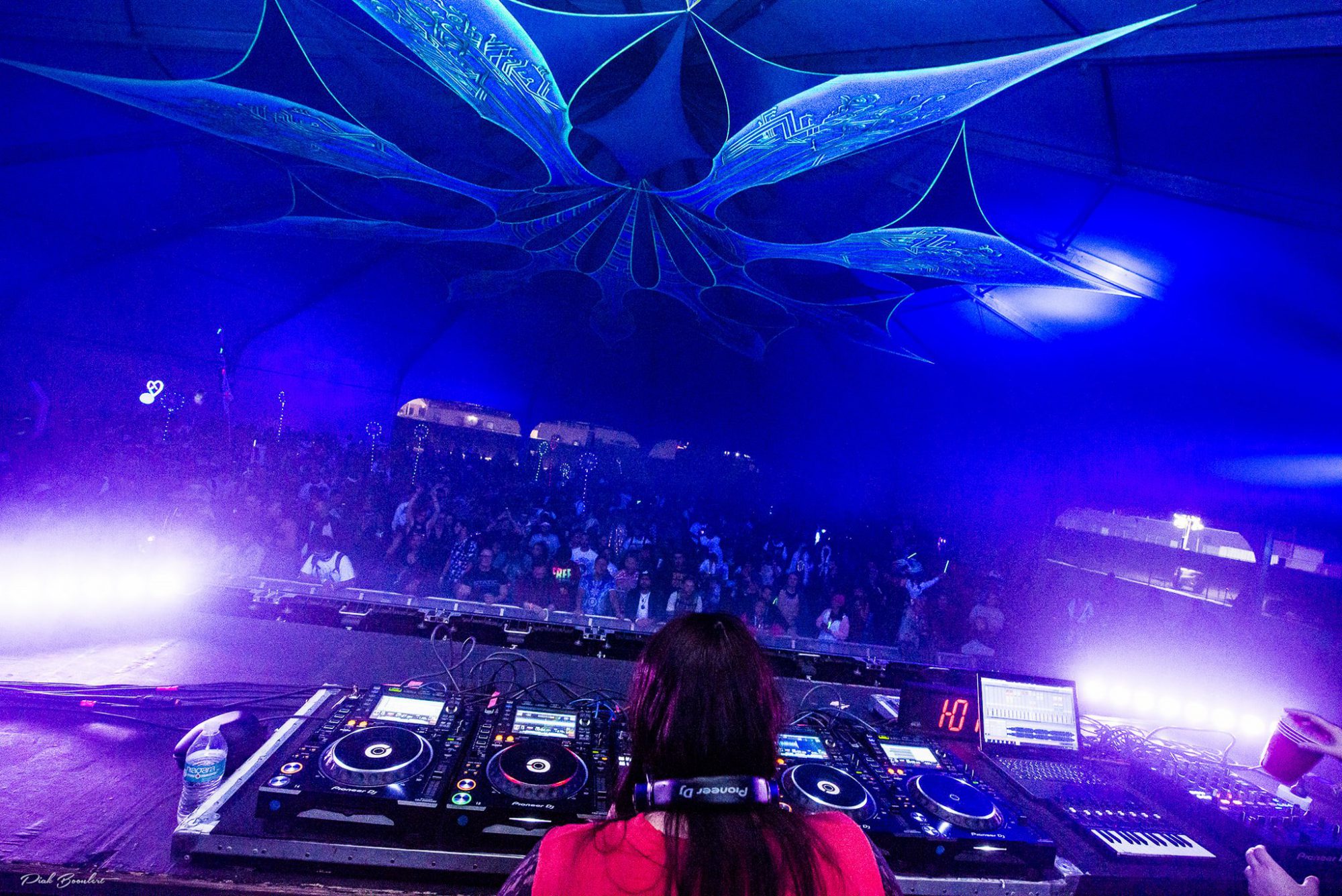
As a listener of psytrance since you were 15 and a DJ since 2011, how has the psy scene changed since you first became involved? It must be totally different from 1997/98 to 2018.
Definitely. In 1997, it was still pretty much goa trance then. I mean it was psychedelic trance but it was known as Goa trance. I got made fun of in school for it because trance was really popular – Oakenfold, Ferry Corsten… I loved it, I went and saw them in the clubs, I loved that style of trance too. For liking goa trance, I got teased. They called me goa princess and it was meant to be derogatory but I was like “whatever”, but as you can see it wasn’t a popular genre at the time.
Over the years, it grew into psychedelic trance in the early 2000s and it kinda changed. It started getting bigger slowly but surely, steadily, but the last few years have been an explosion. Wherever you go, I mean, it’s getting bigger in the states but when you go to some countries and it’s on the radio. It’s bigger in other countries too but I’m glad to see it and also be a part of the growth stateside because I think everyone needs to experience it!
On your Instagram, you said that this is going to be the first time that your dad has come to see you. Tell us a little bit about your family or how your family feels about you DJing or how they might have supported or not supported you.
Initially, they were like “okay, try it this new hobby of yours.” And initially, you don’t really get paid as a DJ and they were like “okay, you’re sort of losing money here,” even though I was like “It’s not about the money!” They just saw me struggling and they weren’t as supportive at the beginning, but as time went on and they saw me grow and they saw what I was accomplishing they started to be really supportive. They just needed to make sure that their daughter was doing something in life that was good for her, and I think they realized that it was my passion and my soul.
My dad has been super supportive, they’re both really proud. My mom wanted to be here too but she’s on her way to Thailand right now to see my grandma. My dad is coming with my uncle though, my cousin is going to be there. They’re all coming through! They’re just staying for my set though, he’s not going to rage all night…I don’t think! I dunno, Maybe I’ll be the gateway for him. I’ll see dad up front with a totem and some Kandi on, be like “yeah Dad, get it!” [Laughs]
They’ve been really great, and I’m really happy that he’s coming tonight and gets to see what I do for the first time on an awesome stage and a great event. It’s perfect. It’s at 6 o’clock and he’s still awake, he hasn’t gone to bed yet. It’s the perfect time.
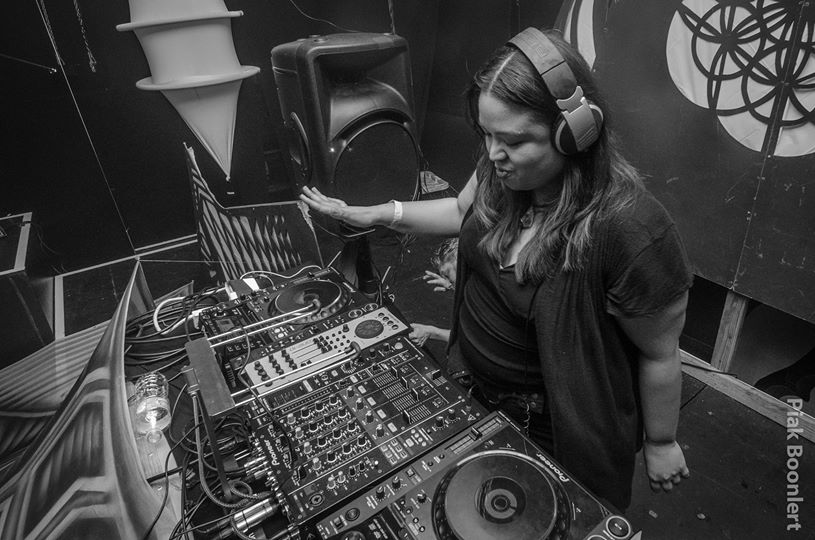
What subgenres of psytrance need to be explored more in the USA?
Progressive is popular as we know. I play progressive and full on. Progressive kinda, for me brings people in. It’s not as high-intensity as some of the other subgenres. Everyone has different and distinct musical tastes and palettes and should explore as much as they can, from subgenres such as the more minimal progressive zenonesque sound, to forest psy, to darkpsy to even hitech if they like it fast. Hopefully, the idea is people explore down the rabbit hole of psy sound, once they’ve been introduced and hooked, and see if the rest is for them!
Finally, we try to not lean towards the question of “how does it feel to be a female in the industry” because we’re sure you’ve answered it a million times, but we’d love to hear about your personal experience.
Yes, yes, absolutely, but to actually answer that question, it’s a good question though! I know it’s a typical one. Representation is important and when you see someone on the stage that represents what you identify with, it makes a big difference. When I DJ, you know how many young girls come up to the front and are looking at me wide-eyed like “I could do that too!” and it’s the best feeling. If I can inspire anyone to follow their dreams or just, even if it’s not DJing, being like “if she can do that, then I can do something I want to do” that’s all I could ask for in this world. Just go, do you!
Connect with Khromata on Social Media:
Website | Facebook | Twitter | Instagram | SoundCloud



